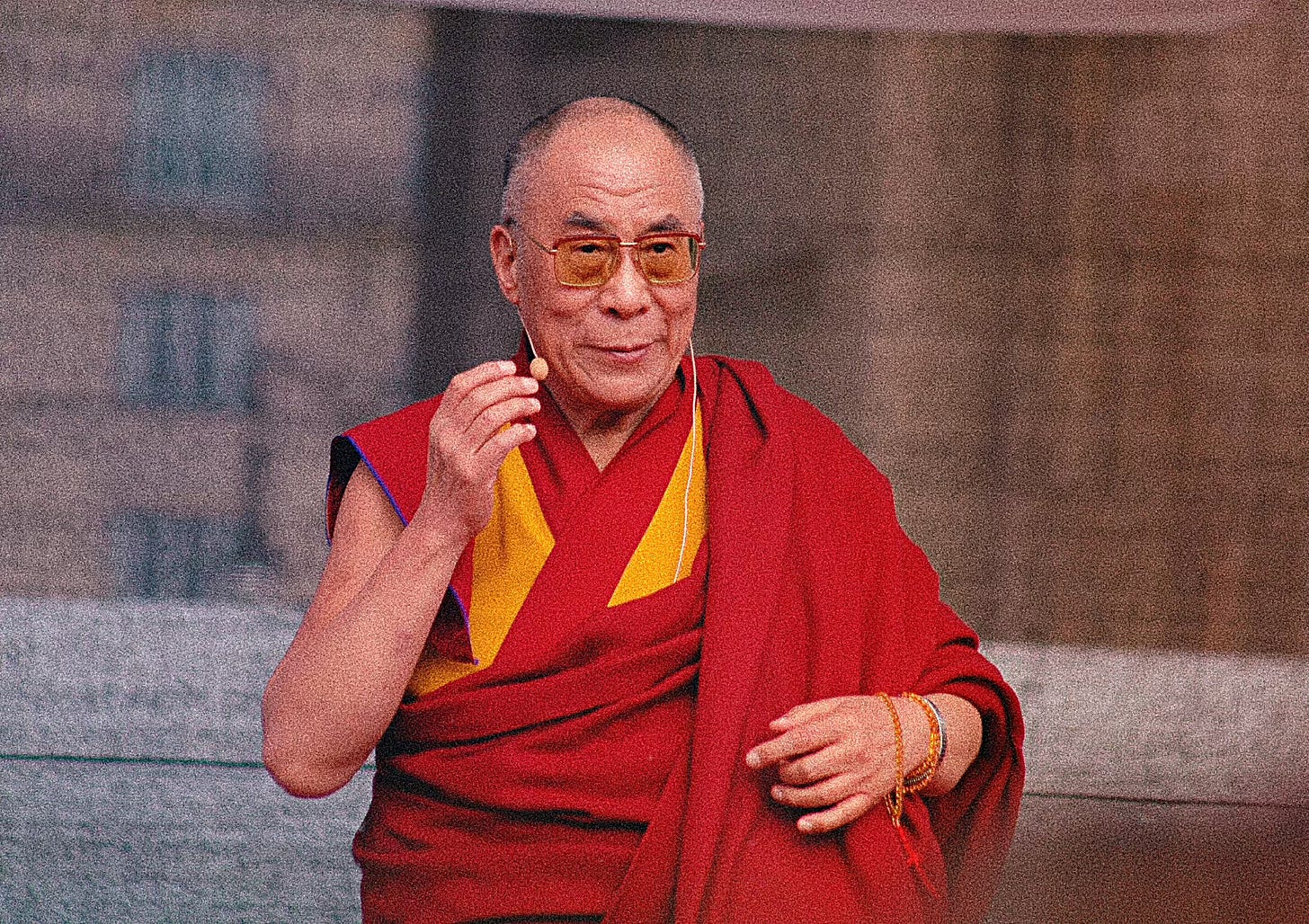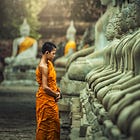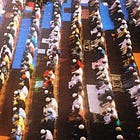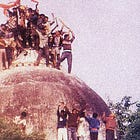Authoritarian Rulers Are Co-Opting the Sphere of the Sacred to Consolidate Control
China’s attempt to designate the new Dalai Lama in violation of longstanding Tibetan tradition is the most visible example of this trend
A geopolitical struggle in Asia is unfolding—not over land or trade but spiritual authority. Earlier this month, the 14th Dalai Lama, the Tibetan spiritual and political leader, turned 90. The Chinese Communist Party, despite being officially atheist, is intent on appointing his successor, seeking control over one of Tibetan Buddhism’s most sacred traditions: reincarnation. The CCP, in power since 1949, has designated greater Tibet as an autonomous region for the last 60 years but governs and counts it as a province within its borders, subject to its oversight. As the CCP sees it, that control extends to the theological plane—since religion is deeply interwoven into Tibetan identity. Far from a peripheral dispute, the Communist party’s attempts to dictate the spiritual lives of Tibetans reflect a global trend of authoritarian regimes capitalizing on the sacred to consolidate power, reframing spiritual legitimacy to serve political ends.
Reincarnation Rift
The Dalai Lama is more than a spiritual figure—he embodies Tibetan identity, continuity, and defiance against authoritarianism. Revered as the human manifestation of Avalokiteśvara, his reincarnation, or tulku, is central to Tibetan Buddhism. But as the current Dalai Lama, Tenzin Gyatso, nears the end of his tenure, Beijing is positioning itself to override this sacred tradition. In 2007, China’s Order No. 5 mandated state approval for all reincarnated lamas, effectively placing an avowedly atheistic party as the arbiter of Tibetan spirituality. This move is part of a broader effort to “Sinicize” religion—reengineering faith to serve state ideology.
The Dalai Lama has publicly stated that he alone will decide whether he reincarnates, and if so, that his successor will be born outside Chinese territory. He has also warned that any successor appointed by Beijing should not be recognized, a clear effort to preempt China’s attempt at religious usurpation. The Tibetan government-in-exile, based in Dharamshala, India, supports this stance and has declared any Chinese-appointed Dalai Lama illegitimate.
If the CCP installs its own Dalai Lama—a “puppet reincarnation”—it would shatter Tibetan spiritual autonomy and set a perilous global precedent for state-controlled religious succession. Beyond undermining religious freedom, it would legitimize politically engineered spirituality and transform a historic faith into a vehicle for the state. The stakes are geopolitical: India, home to the Tibetan exile community, could face tensions with China as will Western democracies, including the U.S. and E.U., that affirm that reincarnation belongs to Tibetans alone.
The battle over reincarnation may seem abstract, even absurd, to modern, secular audiences. But for millions of Tibetans, it is nothing less than a battle for the soul of their nation and faith, a confrontation between spiritual continuity and political subjugation.
For the rest of the world, it is a harbinger of how far authoritarianism is willing to go to control not just public behavior but private belief.
Global Patterns of Spiritual Appropriation
The CCP’s efforts to dictate the reincarnation of the Dalai Lama are not an isolated aberration. Around the world, authoritarian regimes are increasingly using religion not just as a cultural instrument but as a strategic pillar of political consolidation. This strategy—in which states co-opt religious institutions to lend moral legitimacy to power, stifle dissent, and craft nationalistic narratives—is now a fixture of the authoritarian playbook.
In Russia, President Vladimir Putin has forged a deep alliance with the Russian Orthodox Church, transforming it into a quasi-state apparatus for moral reinforcement and ideological control. The church blesses military campaigns, denounces LGBTQ rights as “Western decadence,” and positions Putin as the guardian of Russia’s spiritual and civilizational destiny. Patriarch Kirill of Moscow, the church’s highest leader, called Russia’s invasion of Ukraine a “holy war.” This framing provides a theological cover for aggression, making geopolitical expansion appear divinely sanctioned. It places dissenters in moral, as well as political, opposition to the state. Priests who have opposed the war have faced defrocking, detention, or surveillance, demonstrating how the church now polices not just belief, but allegiance to the Kremlin.
In Turkey, President Recep Tayyip Erdoğan has instrumentalized Sunni Islam to consolidate power under what many now call “Erdoğanism.” His conversion of Istanbul’s Hagia Sophia back into a mosque in 2020 was more than a symbolic act: it was a declaration of ideological supremacy, recasting Turkey’s secular republic as an Islamic-nationalist state. Religious schooling and clerical loyalty to the state have expanded under Erdoğan’s rule, and institutions like the Diyanet, the state’s spiritual authority, now operate with massive budgets and overt political messaging.
India exemplifies this trend as well. Though constitutionally secular, the rise of Hindu nationalism under the Bharatiya Janata Party has blurred the line between religion and state. Hindutva, which defines Indian identity through Hindu primacy, has reshaped public rituals, education, and even citizenship laws, most notably the 2019 Citizenship Amendment Act, widely condemned as discriminatory because it fast-tracks citizenship for persecuted refugees of various faiths except Muslims. Temples have become political stages, and religious spectacles are deployed to reinforce a nationalist mythos. The consecration of the Ram Temple in early 2024 marked a dramatic culmination. Prime Minister Narendra Modi led the ceremony not just as head of government but as a symbolic priest, amidst Vedic chants and sacred fires. The event, heavily choreographed and broadcast, was condemned by civil society and opposition leaders as the “politicization of religion” and a “death knell for secularism”—a stark warning about the growing sacralization of state power and the erosion of pluralism.
Rewriting the Sacred
What drives authoritarian regimes to interfere in spiritual matters, even when they are officially secular or even avowedly atheist? The answer lies not in theology but in power. Authoritarianism, by nature, seeks not just obedience but legitimacy. And throughout history, legitimacy has often flowed from the sacred.
From the Mandate of Heaven in imperial China to the Divine Right of Kings in Europe, rulers have long relied on religious sanction to reinforce their authority. Today’s strongmen, though operating in a vastly different political and technological landscape, are deploying updated versions of the same logic. They understand that the sacred offers a unique kind of authority: one that is internalized, intimate, and often unquestionable. Where state propaganda must be manufactured and reinforced, religious legitimacy can be inherited or appropriated.
In China, the CCP’s desire to appoint the next Dalai Lama is part of a broader effort to recast Buddhism in the image of the party. As the Asian studies and Buddhism scholar John Powers has noted, the CCP has tried to situate Tibetan Buddhism within Chinese history and identity, aligning spiritual authority and religious education with loyalty to the party and the Chinese state. This is not merely about religious regulation; it is about transforming spiritual authority into a tool of nationalism.
The strategy goes beyond Buddhism. The Sinicization of Islam has seen mosques demolished, domes flattened, Arabic script removed, and Uyghur religious leaders detained or disappeared. In each case, the message is clear: religion is allowed only if it serves the ideological framework of the state. Independent belief is not just frowned upon; it is framed as a threat to national unity.
In Russia, this pursuit of metaphysical control manifests through a revival of Byzantine symphonia, a historical notion of church-state harmony now repurposed to elevate Putin as a “messianic” figure. The Kremlin has fused Orthodox ritual with military and political ceremony, cloaking earthly conquest in spiritual language. The result is not a theocracy, but a post-secular nationalism; one that weaponizes religion without submitting to it.
India’s case is more nuanced but equally critical. While the state’s relationship with religion is not uniform, the Hindutva movement aims to recast Hinduism from a pluralistic faith into a majoritarian political identity. This project seeks to conjoin religion and citizenship and fudge the line between mythology and history, redefining belonging along sectarian terms while erasing the cultural contributions of other communities.
Authoritarian regimes don’t just politicize religion: they reconstruct it to consolidate power, recognizing that spiritual legitimacy shapes identity, loyalty, and meaning. By reengineering faith through state-approved narratives, reincarnation claims, or religious law, they strip believers of spiritual agency and frame dissent as heresy. This fusion of the sacred and the political cloaks power in divine spirit, shielding regimes from accountability. Today’s “managed spirituality” is not a relic, but a deliberate, strategic tool of control. Liberal democracies must confront this with imagination.
Liberalism Must Oppose Authoritarian Spiritual Capture
For liberal democracies, the authoritarian appropriation of the sacred presents a defining test. These regimes do not merely repress religion—they co-opt it with nationalist fervor, cloaking political power in divine language. Responding to this challenge is, admittedly, fraught: speaking out risks charges of cultural imperialism, while silence fails to defend liberal-democratic values such as freedom of conscience, the free exercise of faith, and the importance of creating space for the flourishing of pluralism in all its forms, including of a religious kind. Symbolic gestures—such as the U.S. declaring that the Dalai Lama’s reincarnation must be left to Tibetans—are important but insufficient without sustained legal, diplomatic, and cultural commitment.
Democracies must treat spiritual autonomy as a global norm, building coalitions to uphold the right of religious communities—especially minorities and exiles—to define their leaders and doctrines free from state control. This is not interference; it is principled solidarity. Legislative tools like the U.S. Tibetan Policy and Support Act of 2020, which threatens sanctions against those meddling in reincarnation, offer a model. Similar frameworks can deter authoritarian overreach elsewhere.
At the same time, liberal democracies must amplify the moral authority of exiled spiritual leaders—from the Dalai Lama to Uyghur imams and persecuted pastors—by offering platforms in parliaments, universities, and global forums. This is diplomacy of moral clarity, not coercion. Yet credibility depends on consistency: democracies cannot defend spiritual freedom abroad while tolerating hate, discrimination, or politicized religion at home.
Civil society and academia must rise to the moment. Think tanks, rights groups, and universities can document spiritual appropriation, preserve repressed narratives, and foster pluralistic dialogue. This is especially urgent as authoritarian regimes use AI surveillance, censorship, and disinformation to control religious spaces.
Ultimately, this is more than a cultural issue—it is a moral and civilizational one. The sacred has always been a double-edged sword, capable of inspiring liberation or legitimizing violence. Liberalism at its best does not seek to erase the sacred by separating state and religion, but refuses to monopolize it. From Gandhi and MLK to Tibetan monks, spiritual resistance has historically upheld dignity against tyranny. Yet history warns that when religion is distorted to serve power, persecution and exclusion follow.
Liberal democracies must act—not just with rhetoric, but with tangible support: interfaith solidarity, legal safeguards for the persecuted, and spaces for belief to flourish without coercion. As Václav Havel wrote, “living in truth” begins by resisting the state’s grip on moral meaning. Today, it means standing with those resisting spiritual subjugation—from monasteries and mosques to legislatures and courts.
The stakes go far beyond Tibet. They cut to the heart of democratic freedom: who speaks for the soul of a people, and whether that voice is freely chosen or state-assigned. As the world awaits the next Dalai Lama, the real question is whether liberal societies have the courage to affirm a fundamental truth: the sacred belongs to the seeker—not the state.
Sacred Resistance in a Secular Age
The metaphysical dispute over the Dalai Lama’s reincarnation is, in fact, a defining test of 21st-century freedom. When authoritarian regimes lay claim to the sacred, they assert control over meaning, identity, and spiritual legitimacy itself. In such a world, governing reincarnation becomes governing the soul.
Liberal democracies must respond with clarity and conviction. Spiritual self-determination must be defended as fiercely as free speech or the right to vote. That means enshrining legal protections for exiled religious communities, promoting civic pluralism, and building international coalitions that defend belief without imposing it. It also requires moral leadership at home, ensuring that domestic policies reflect the values democracies seek to champion abroad.
History reminds us that the sacred has empowered both liberation and oppression. The real question is who gets to define it—communities or the state. From Milarepa’s meditative defiance to the nonviolent resistance of Gandhi and Solzhenitsyn, true spiritual freedom begins by refusing to let power dictate faith.
This is a civilizational crisis beyond politics. Authoritarianism’s reach into the spiritual is not a relic, but a growing frontier. Whether democracies meet this challenge will shape not just religious freedom, but the soul of democracy itself.
© The UnPopulist, 2025
Follow us on Bluesky, Threads, YouTube, TikTok, Facebook, Instagram, and X.
We welcome your reactions and replies. Please adhere to our comments policy.










A good example of what you're describing can be found in post WW II Poland, which was dominated by the U.S.S.R. and had a communist regime imposed on it. The Catholic religion served as a patriotic rallying point for the vast majority of Poles and helped hold the national identity together. They were ultimately successful in throwing off the totalitarian yoke.
Thank you for a great perspective that some of us in the West don't think about because we don't take religion as seriously as many do and authoritarians must.
The CPC can choose the next Dalai Lama but no one can be forced to accept him inside or outside of Tibet.
The other Orthodox Christians Churches from the Ecumenical Patriarch down have condemned the path that the Russian Orthodox Church has chosen.
Since World War 2 the Roman Church has been vigilant to avoid letting the Church be co-opted whether from the political left or right but has also been solicitous for resistance movements against authoritarians.
The CPC has tried to force alternative spiritual leadership for Tibet and always failed miserably.
I found this article interesting as well:
https://www.chinafile.com/reporting-opinion/viewpoint/tibetan-government-exile-has-new-strategy#:~:text=An%20unexpected%20development%20has%20taken,before%20his%20health%20declines%20further.